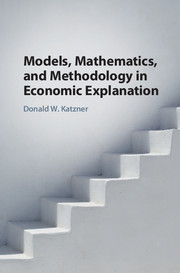Book contents
- Frontmatter
- Dedication
- Contents
- Preface
- Introduction
- 1 Science and Economics
- 2 Economic Models and Explanation
- 3 The Stages of Model Building in Economics
- 4 Models and Mathematics
- 5 Models and Measurement (or Lack Thereof)
- 6 Issues Relating to the Construction of Models from Scratch
- 7 An Example: The Efficiency of Organizational Forms
- 8 The Implicit Assumption Requirements of Later-Stage Model Building
- 9 Ordinality and the Adequacy of Analytic Specification
- 10 Categories of Models
- 11 Conclusion
- Index
Introduction
Published online by Cambridge University Press: 26 October 2017
- Frontmatter
- Dedication
- Contents
- Preface
- Introduction
- 1 Science and Economics
- 2 Economic Models and Explanation
- 3 The Stages of Model Building in Economics
- 4 Models and Mathematics
- 5 Models and Measurement (or Lack Thereof)
- 6 Issues Relating to the Construction of Models from Scratch
- 7 An Example: The Efficiency of Organizational Forms
- 8 The Implicit Assumption Requirements of Later-Stage Model Building
- 9 Ordinality and the Adequacy of Analytic Specification
- 10 Categories of Models
- 11 Conclusion
- Index
Summary
The methodology and analytics of model construction in the social sciences has lately attracted a good deal of interest, including valuable efforts by scholars in the economics discipline. The existing literature is extensive and important. But it tends to move in a somewhat different direction from that which is of concern in the present volume. That is, the focus of attention here exists in sharp contrast with the general scope, perspectives, and purposes of much of the literature which precedes it and which will be referred to elsewhere in this book.
The primary aim of subsequent chapters is to present a scheme of argument that throws necessary light on actual model building procedures that contribute to economic explanation. In particular, it develops and explores a five-stage model building format, including within it a number of elements having significant real-world relevance. That, in practitioner terms, permits the description of models that not only cohere in their separate elements but exhibit correspondences, or bridges, to empirical realities.
The sub-discipline of economic model building has for a long time, of course, occupied a place in analytical, as opposed to descriptive, economics. It has often existed on the level of unarticulated assumptions about the way the world works. But since the discipline of economics severed its attachment to moral philosophy and emerged to gain autonomous academic respectability, since Adam Smith enlightened economists about his pin factory and his functioning market concepts, since Ricardo and the classical economists understood the market system to function automatically at a level of high employment and economic welfare, since the neoclassicists embraced for analytical usage notions of full information, certainties of knowledge, and infinitely rapid market adjustment mechanisms — since those earlier developments, thinking about economic reality has increasingly employed well-specified models of the ways in which systems under investigation operate. It was not necessary in previous times to articulate a full model's construction to contemplate, for example, that if there should be an increase in market demand for a commodity without any change in supply conditions, there would, in the general scheme of things, be a rise in the price at which the market cleared or equilibrated. Indeed, such imaginations, based as they were inherently on not-fully-articulated models, soon found their way into the general public consciousness, quite apart from their developing significance for analytical economics.
- Type
- Chapter
- Information
- Publisher: Cambridge University PressPrint publication year: 2017



